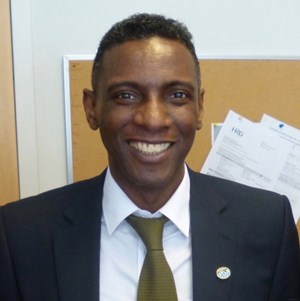To honour Black History Month the Royal Society met with Dr Mark Richards to hear why he believes the Career Development Fellowships supporting underrepresented groups will catalyse researcher career progression.

The Career Development Fellowship (CDF) is a four-year, postdoctoral research fellowship that aims to support the retention in STEM of researchers from underrepresented backgrounds. The scheme will initially run as a pilot with researchers from Black heritage. If successful, the pilot may be broadened to researchers from other underrepresented groups.
The scheme has been developed following cross-sector roundtables and Royal Society-commissioned reports which looked at trends across 11 years of Higher Education Statistics Authority (HESA) data and benchmarked the Society’s early career fellowships (PDF) against the eligible applicant pool.
Dr Richards Senior Teaching Fellow, Imperial College London and a member of the Royal Society’s Diversity and Inclusion Committee, said:
“Over the years, Black History Month has often been used as a time to reflect and celebrate achievements of the past. Personally, for me this year, it feels like in addition, history is currently being made for future generations to celebrate. The Royal Society Career Development Fellowship scheme demonstrates that at the highest-level, institutions are willing to directly impact change through targeted programmes if there is sufficient data and evidence that supports such action.”
“Having been exposed to the academic pipeline myself and having to often think on my feet as I went along, one important step towards gaining a permanent academic position is a research fellowship. Naturally they are very competitive, however Black applicants are disproportionately unsuccessful in obtaining such fellowships. Part of my feeling was that if this issue is not addressed then we would never really make serious inroads into increasing the very low numbers of Black academics in STEM.”
Why is this important now?
“I think this is important now because over the last few years there's been a lot of drive to improve representation address equality issues within STEM, though often this is at the secondary school or possibly undergraduate level. Whilst this work is extremely important and valid, it does little for those relatively few Black researchers who are currently traversing the academic pipeline and perhaps are slightly further along.”
How will this impact the sector?
“Five places may seem relatively low, but over time those researchers will eventually become lecturers, professors, and lead their own research teams. This will have a re-enforcing impact as it is hoped that they would become natural advocates for the demographic they represent.”
How will this support early career individuals?
- “It provides a clear grounding from which to progress their career towards becoming an independent researcher.
- It re-enforces a sense of belonging to the discipline.
- It provides a level of autonomy, allowing them to bring more of their authentic selves to the environment.”
Why should people get involved?
“Many current global and technological challenges will ultimately be solved by the next generation of scientists, engineers and policy makers. This will require diverse inputs from diverse perspectives. The only way this can truly happen is if the scientific career framework is open and inclusive to everyone involved in science at whatever level. We should support these initiatives as it's helping to create a more inclusive playing field to give future generations every chance.”
How would CDF have supported your career if it had been available?
“Personally, if this scheme was in place during the early part of my career, it would have certainly helped to catalyse my career progression and demystify certain aspects of academia through being exposed early-on to a high-quality network of esteemed mentors and sponsors.”
The scheme has been developed following cross-sector roundtables and Royal Society-commissioned reports which looked at trends across 11 years of Higher Education Statistics Authority (HESA) data and benchmarked the Society’s early career fellowships (PDF) against the eligible applicant pool.
This process identified a need for interventions across the academic pipeline to support UK-based researchers from Black or Mixed Black heritage backgrounds, particularly researchers making the transition from postgraduate to early postdoctoral stages.
The scheme opens to applicants on 7 November with submissions closing on 24 January. For additional advice and information, see our Career Development Fellowship page or contact the Career Development Fellowship team.
Dr Mark Richards, Senior Teaching Fellow and Director of Outreach within the Faculty of Natural Sciences at Imperial College London, has a track record of cutting across traditional academic boundaries to explore multidisciplinary research, education and outreach. He has spent several years in industry across different sectors, including instrumentation, environmental science, ICT and Finance. He is also a member of the Royal Society’s Diversity and Inclusion Committee.




